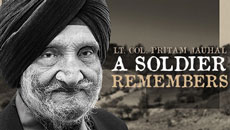Feeding food to others is known to be one of the most noble deeds in the world. In this light, the tradition of Langar is a longstanding symbol of selfless service. No matter where one is in the world, free food is offered to anyone who reaches the doorstop of any Gurdwara regardless of faith. As the largest communal free kitchen in the world, Sri Harmandir Sahib Ji, renownedly known as the Golden Temple, serves 50,000 to 100,000 people a day. The concept of Langar, in the Sikh context, originates from the first Guru, who, in his youth, received money from his father to conduct business. However, rather than yielding a profit, Guru Nanak Dev Ji chose to feed hungry pilgrims. Today, many pay homage to Gurdwara Sacha Sauda Sahib Ji, situated on the monumental spot where the pilgrims were fed. This event gave rise to a tradition which was further solidified by the Gurus that followed.
The strongest wave surrounding the format of Langar came from Mata Kheevi Ji, wife of the second Guru, Guru Angad Dev Ji. Being in charge of serving Langar, she has been praised in historical texts for her genuine generosity and passion towards serving others, including various mentions in Sri Guru Granth Sahib Ji, like the following:
la(n)gar dhaulat va(n)ddeeaai ras a(n)mrit kheer ghiaalee ||
“She distributes the bounty of the Guru's Langar; the kheer - the rice pudding and ghee, is like sweet ambrosia.”
- Raag Raamkalee, Bhatt Sathaa & Balvand, Sri Guru Granth Sahib Ji, Ang 967
After Guru Angad Dev Ji’s time, the third Guru, Guru Amardas Ji, implemented a rule at Sri Goindwal Sahib Ji, according to which no one could meet the Guru until they had eaten Langar. This rule was not even bent for the emperor, which was a revolutionary move in a hierarchical society. This Gurdwara is at the center of the inception of many religious elements including sports, Gurmukhi and Langar.
The importance of Langar and its unique purpose can be traced back to its beginnings in India. At a time when the caste system was heavily dominant, the poor could not even enter religious temples. Using separate utensils, food was often thrown at devotees rather than served, based on discriminatory grounds. The concept of Pangat, or Langar, introduced a philosophy where both the king and beggar would eat the same food at the same level. Symbolically, and literally, one would not be higher or lower than the other.

Therefore, Langar depicts a message of equality and oneness, breaking the shackles of color, caste, community, gender or status. There is no special treatment and nothing is hidden from the public, instilling values of humble acceptance and gratitude. Moreover, the original term being Guru Ka Langar, implies that the Langar does not belong to a specific country, person, or institution. Transcending beyond discrimination, even the process of preparation, cooking, serving, and cleaning is a shared experience.
For this reason, it is also important to recognize that Langar is not just limited to food; it entails serving people to fulfill their needs in any area – be it of medication, clothing, or even education. Especially during the COVID-19 pandemic, for example, many organizations have stepped up to provide information, vaccinations, and resources. free of cost. While Langar comes in many forms, the essence of serving others wholeheartedly allows one to find in themselves the heart to give without expecting anything in return. For both the giver and receiver, the impact is a treasured experience.

In the modern age, however, we must be careful in preserving the true meaning of Langar, rooted in its simplicity and compassion towards humanity. As the channels through which we serve evolve, we should not compete with others, but recognize service as a catalyst of unity. Playing our role entails simple steps such as being more mindful, taking only what we need, reducing imperishable waste and promoting health. Taking these steps paves the path for one to reap maximum utility from a more wholesome involvement and truly embrace the glory of Langar, treating it as a holy experience that feeds both the body and soul!






